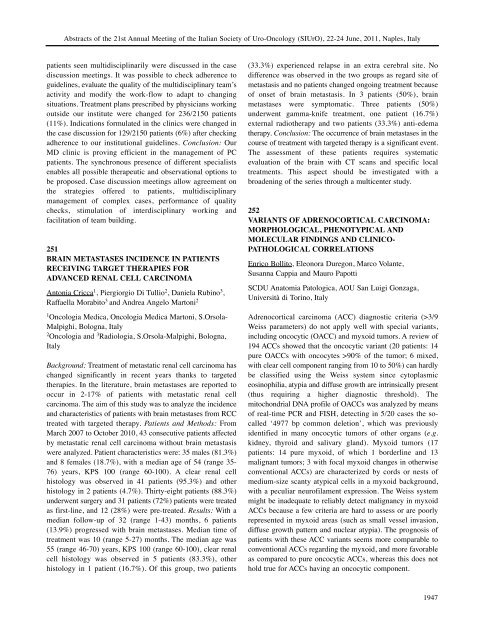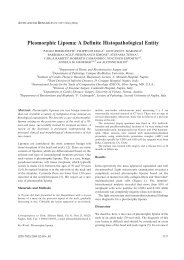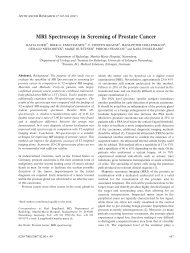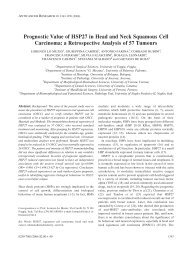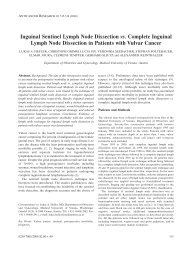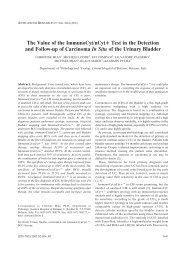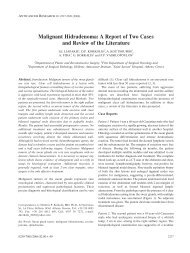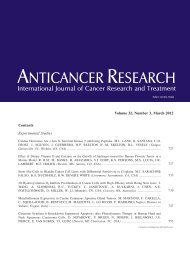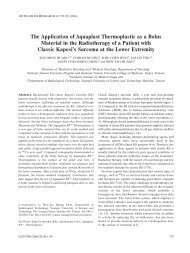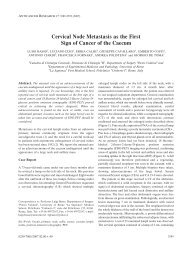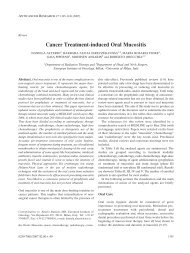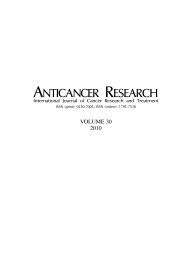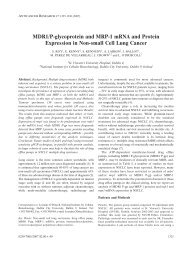ABSTRACTS OF THE 21st ANNUAL MEETING OF THE ITALIAN ...
ABSTRACTS OF THE 21st ANNUAL MEETING OF THE ITALIAN ...
ABSTRACTS OF THE 21st ANNUAL MEETING OF THE ITALIAN ...
You also want an ePaper? Increase the reach of your titles
YUMPU automatically turns print PDFs into web optimized ePapers that Google loves.
Abstracts of the <strong>21st</strong> Annual Meeting of the Italian Society of Uro-Oncology (SIUrO), 22-24 June, 2011, Naples, Italy<br />
patients seen multidisciplinarily were discussed in the case<br />
discussion meetings. It was possible to check adherence to<br />
guidelines, evaluate the quality of the multidisciplinary team’s<br />
activity and modify the work-flow to adapt to changing<br />
situations. Treatment plans prescribed by physicians working<br />
outside our institute were changed for 236/2150 patients<br />
(11%). Indications formulated in the clinics were changed in<br />
the case discussion for 129/2150 patients (6%) after checking<br />
adherence to our institutional guidelines. Conclusion: Our<br />
MD clinic is proving efficient in the management of PC<br />
patients. The synchronous presence of different specialists<br />
enables all possible therapeutic and observational options to<br />
be proposed. Case discussion meetings allow agreement on<br />
the strategies offered to patients, multidisciplinary<br />
management of complex cases, performance of quality<br />
checks, stimulation of interdisciplinary working and<br />
facilitation of team building.<br />
251<br />
BRAIN METASTASES INCIDENCE IN PATIENTS<br />
RECEIVING TARGET <strong>THE</strong>RAPIES FOR<br />
ADVANCED RENAL CELL CARCINOMA<br />
Antonia Cricca1 , Piergiorgio Di Tullio2 , Daniela Rubino3 ,<br />
Raffaella Morabito3 and Andrea Angelo Martoni2 1Oncologia Medica, Oncologia Medica Martoni, S.Orsola-<br />
Malpighi, Bologna, Italy<br />
2Oncologia and 3Radiologia, S.Orsola-Malpighi, Bologna,<br />
Italy<br />
Background: Treatment of metastatic renal cell carcinoma has<br />
changed significantly in recent years thanks to targeted<br />
therapies. In the literature, brain metastases are reported to<br />
occur in 2-17% of patients with metastatic renal cell<br />
carcinoma. The aim of this study was to analyze the incidence<br />
and characteristics of patients with brain metastases from RCC<br />
treated with targeted therapy. Patients and Methods: From<br />
March 2007 to October 2010, 43 consecutive patients affected<br />
by metastatic renal cell carcinoma without brain metastasis<br />
were analyzed. Patient characteristics were: 35 males (81.3%)<br />
and 8 females (18.7%), with a median age of 54 (range 35-<br />
76) years, KPS 100 (range 60-100). A clear renal cell<br />
histology was observed in 41 patients (95.3%) and other<br />
histology in 2 patients (4.7%). Thirty-eight patients (88.3%)<br />
underwent surgery and 31 patients (72%) patients were treated<br />
as first-line, and 12 (28%) were pre-treated. Results: With a<br />
median follow-up of 32 (range 1-43) months, 6 patients<br />
(13.9%) progressed with brain metastases. Median time of<br />
treatment was 10 (range 5-27) months. The median age was<br />
55 (range 46-70) years, KPS 100 (range 60-100), clear renal<br />
cell histology was observed in 5 patients (83.3%), other<br />
histology in 1 patient (16.7%). Of this group, two patients<br />
(33.3%) experienced relapse in an extra cerebral site. No<br />
difference was observed in the two groups as regard site of<br />
metastasis and no patients changed ongoing treatment because<br />
of onset of brain metastasis. In 3 patients (50%), brain<br />
metastases were symptomatic. Three patients (50%)<br />
underwent gamma-knife treatment, one patient (16.7%)<br />
external radiotherapy and two patients (33.3%) anti-edema<br />
therapy. Conclusion: The occurrence of brain metastases in the<br />
course of treatment with targeted therapy is a significant event.<br />
The assessment of these patients requires systematic<br />
evaluation of the brain with CT scans and specific local<br />
treatments. This aspect should be investigated with a<br />
broadening of the series through a multicenter study.<br />
252<br />
VARIANTS <strong>OF</strong> ADRENOCORTICAL CARCINOMA:<br />
MORPHOLOGICAL, PHENOTYPICAL AND<br />
MOLECULAR FINDINGS AND CLINICO-<br />
PATHOLOGICAL CORRELATIONS<br />
Enrico Bollito, Eleonora Duregon, Marco Volante,<br />
Susanna Cappia and Mauro Papotti<br />
SCDU Anatomia Patologica, AOU San Luigi Gonzaga,<br />
Università di Torino, Italy<br />
Adrenocortical carcinoma (ACC) diagnostic criteria (>3/9<br />
Weiss parameters) do not apply well with special variants,<br />
including oncocytic (OACC) and myxoid tumors. A review of<br />
194 ACCs showed that the oncocytic variant (20 patients: 14<br />
pure OACCs with oncocytes >90% of the tumor; 6 mixed,<br />
with clear cell component ranging from 10 to 50%) can hardly<br />
be classified using the Weiss system since cytoplasmic<br />
eosinophilia, atypia and diffuse growth are intrinsically present<br />
(thus requiring a higher diagnostic threshold). The<br />
mitochondrial DNA profile of OACCs was analyzed by means<br />
of real-time PCR and FISH, detecting in 5/20 cases the socalled<br />
‘4977 bp common deletion’, which was previously<br />
identified in many oncocytic tumors of other organs (e.g.<br />
kidney, thyroid and salivary gland). Myxoid tumors (17<br />
patients: 14 pure myxoid, of which 1 borderline and 13<br />
malignant tumors; 3 with focal myxoid changes in otherwise<br />
conventional ACCs) are characterized by cords or nests of<br />
medium-size scanty atypical cells in a myxoid background,<br />
with a peculiar neurofilament expression. The Weiss system<br />
might be inadequate to reliably detect malignancy in myxoid<br />
ACCs because a few criteria are hard to assess or are poorly<br />
represented in myxoid areas (such as small vessel invasion,<br />
diffuse growth pattern and nuclear atypia). The prognosis of<br />
patients with these ACC variants seems more comparable to<br />
conventional ACCs regarding the myxoid, and more favorable<br />
as compared to pure oncocytic ACCs, whereas this does not<br />
hold true for ACCs having an oncocytic component.<br />
1947


